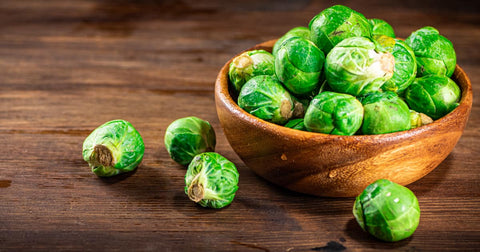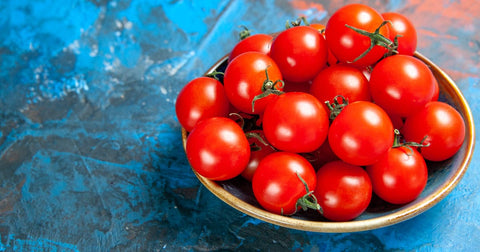Brussels sprouts, those miniature cabbages packed with nutrients, have earned a reputation for being both delicious and, well, a bit gassy. If you're considering adding Brussels sprouts to your diet or have experienced some digestive discomfort after consuming them, you might be wondering, "Do Brussel sprouts cause gas?"

The answer, like many things in nutrition, is nuanced. While Brussels sprouts can indeed contribute to gas production, understanding why and how to minimize these effects can help you enjoy this superfood without digestive woes.
Why Do Brussel Sprouts Cause Gas?
Brussels sprouts, like other cruciferous vegetables (broccoli, cauliflower, cabbage), contain a complex sugar called raffinose. Our bodies lack the enzyme needed to break down raffinose, so it travels undigested to the large intestine. Here, gut bacteria ferment it, producing gas as a byproduct.
Do Brussel Sprouts Make You Gassy?
Yes, Brussels sprouts can make you gassy. The amount of gas produced varies depending on:
-
Individual gut microbiome: The composition of your gut bacteria influences how much gas is produced.
-
Quantity consumed: Larger servings of Brussels sprouts naturally lead to more gas.
-
Cooking method: How you prepare Brussels sprouts can affect their digestibility and gas production.
How to Reduce Gas from Brussels Sprouts

-
Start with small portions: Introduce Brussels sprouts gradually to allow your gut to adapt.
-
Cook them thoroughly: Steaming, roasting, or stir-frying can make them easier to digest.
-
Consider digestive enzymes: Over-the-counter digestive enzyme supplements containing alpha-galactosidase might help break down raffinose and reduce gas.
Are Brussel Sprouts Keto?
Yes, Brussels sprouts are generally considered keto-friendly due to their low carbohydrate content.
Brussel Sprouts Carbs: A Closer Look
One cup of cooked Brussels sprouts contains about 8 grams of carbohydrates, but 4 grams of those are fiber, resulting in only 4 grams of net carbs. This makes them a suitable addition to a low-carb or ketogenic diet.
Are Brussel Sprouts Good for Weight Loss?
Yes, Brussels sprouts can be beneficial for weight loss. They are low in calories, high in fiber, and provide a feeling of fullness, potentially aiding in appetite control.
Do Brussel Sprouts Make You Poop?
Yes, the fiber in Brussels sprouts can help promote regular bowel movements and prevent constipation.
Food Intolerance and Digestive Health
If you experience persistent digestive issues, including excessive gas or bloating after eating Brussels sprouts, consider the possibility of a food intolerance or sensitivity.
A food sensitivity test kit can help you identify specific foods that might be triggering your symptoms. By eliminating or reducing these trigger foods, you can potentially alleviate your digestive problems and improve your overall gut health.
Key Takeaways:

-
Brussels sprouts can cause gas due to their raffinose content.
-
Cooking methods and individual gut bacteria influence gas production.
-
Brussels sprouts are low in carbs and can be beneficial for weight loss and gut health.
-
If you experience digestive issues after eating Brussels sprouts, consider a food sensitivity test to identify potential food intolerances.
Remember, this article is intended for informational purposes only and should not be considered a substitute for professional medical advice. If you have any concerns about your health or dietary choices, consult a qualified healthcare professional.
Frequently Asked Questions:
1. How can I cook Brussels sprouts to reduce gas?
Try steaming, roasting, or stir-frying Brussels sprouts to make them easier to digest and reduce gas production. Avoid overcooking them, as this can make them mushy and less flavorful.
2. Are there any other vegetables that cause gas like Brussels sprouts?
Yes, other cruciferous vegetables, such as broccoli, cauliflower, cabbage, and kale, also contain raffinose and can cause gas. However, individual tolerance varies, so you might find that you tolerate some of these vegetables better than others.
3. I love Brussels sprouts but hate the gas they cause. Are there any alternatives?
If you're looking for similar vegetables with less gas-producing potential, consider trying asparagus, green beans, or spinach.
4. Can I take anything to prevent gas from Brussels sprouts?
Over-the-counter digestive enzyme supplements containing alpha-galactosidase can help break down raffinose and reduce gas. You can also try activated charcoal capsules, which can help absorb excess gas in your digestive system.
5. I'm experiencing digestive issues after eating Brussels sprouts, but I don't think it's just gas. Could it be a food intolerance?
Yes, it's possible to have a food intolerance or sensitivity to Brussels sprouts or other cruciferous vegetables. If you experience symptoms like bloating, diarrhea, or abdominal pain, consider a food sensitivity test to identify potential triggers and make informed dietary choices.


.png?v=1737390083)
.png?v=1737187409)


